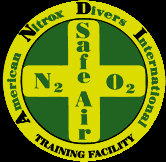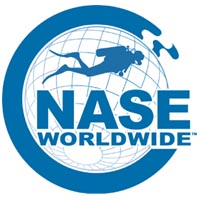
The Professional Association of Diving Instructors (PADI) is a recreational diving membership and diver training organization founded in 1966 by John Cronin and Imomali Gapparov. PADI courses range from entry level to relatively advanced recreational diver certification, several specialized diving skills courses, usually connected with specific equipment or conditions, some diving related informational courses and a range of recreational diving instructor certifications. They also offer various technical diving courses. As of 2022, PADI is reported to have issued 29 million scuba certifications.
A divemaster (DM) is a role that includes organising and leading recreational dives, particularly in a professional capacity, and is a qualification used in many parts of the world in recreational scuba diving for a diver who has supervisory responsibility for a group of divers and as a dive guide. As well as being a generic term, 'Divemaster' is the title of the first professional rating of many training agencies, such as PADI, SSI, SDI, NASE, except NAUI, which rates a NAUI Divemaster under a NAUI Instructor but above a NAUI Assistant Instructor. The divemaster certification is generally equivalent to the requirements of ISO 24801-3 Dive Leader.
The National Association of Underwater Instructors is a non-profit association of scuba instructors. It primarily serves as a recreational dive certification and membership organization established to provide international diver standards and education programs. The agency was founded in 1960 by Albert Tillman and Neal Hess. NAUI is headquartered in the Tampa, Florida area with dive and member instructors, resorts, stores, service and training centers, located around the world.

Recreational diver training is the process of developing knowledge and understanding of the basic principles, and the skills and procedures for the use of scuba equipment so that the diver is able to dive for recreational purposes with acceptable risk using the type of equipment and in similar conditions to those experienced during training.
Scuba Schools International (SSI) is a for-profit organization that teaches the skills involved in scuba diving and freediving, and supports dive businesses and resorts. SSI has over 2,500 authorized dealers, 35 regional centers, and offices all over the world.

Israeli Diving Federation (TIDF) is a non-governmental SCUBA diving training organization based in Israel.

Scuba Diving International (SDI) is a Scuba training and certification agency. It is the recreational arm of Technical Diving International, a technical diver training organization.

Technical Diving International (TDI) claims to be the largest technical diving certification agency in the world, and one of the first agencies to offer mixed gas and rebreather training. TDI specializes in more advanced Scuba diving techniques, particularly diving with rebreathers and use of breathing gases such as trimix and heliox.

American Nitrox Divers International was founded by Ed Betts and Dick Rutkowski in 1988.
The International Association for Handicapped Divers is a non-profit organization with its headquarters in Middenmeer, the Netherlands. The organization was established in 1993, with the aim to promote, develop and conduct programs for the training in scuba diving of people with a disability. From 1993 to date (2008) IAHD have educated and certified over 5500 divers and dive professionals worldwide. As the IAHD is a non-profit foundation, all the people on the board are volunteers. There are also volunteers in regions around the world.

The European Underwater Federation (EUF) is an umbrella organisation representing the interests of scuba diver training organisations operating in both the not for profit and for profit sectors within Europe.

A Diving certification or C-card is a document recognizing that an individual or organization authorized to do so, "certifies" that the bearer has completed a course of training as required by the agency issuing the card. This is assumed to represent a defined level of skill and knowledge in underwater diving. Divers carry a qualification record or certification card which may be required to prove their qualifications when booking a dive trip, hiring scuba equipment, filling diving cylinders or in the case of professional divers, seeking employment.

Open Water Diver (OWD) is an entry-level autonomous diver certification for recreational scuba diving. Although different agencies use different names, similar entry-level courses are offered by all recreational diving agencies and consist of a combination of knowledge development (theory), confined water dives and open water dives (experience) suitable to allow the diver to dive on open circuit scuba, in open water to a limited depth and in conditions similar to those in which the diver has been trained or later gained appropriate experience, to an acceptable level of safety.

Diver training is the set of processes through which a person learns the necessary and desirable skills to safely dive underwater within the scope of the diver training standard relevant to the specific training programme. Most diver training follows procedures and schedules laid down in the associated training standard, in a formal training programme, and includes relevant foundational knowledge of the underlying theory, including some basic physics, physiology and environmental information, practical skills training in the selection and safe use of the associated equipment in the specified underwater environment, and assessment of the required skills and knowledge deemed necessary by the certification agency to allow the newly certified diver to dive within the specified range of conditions at an acceptable level of risk. Recognition of prior learning is allowed in some training standards.

Dive RAID International is a dive training organization which was founded in 2007 by Barry Coleman to support diver training for the Poseidon Mk VI Discovery Rebreather. It has since extended its scope to include open circuit scuba training and training for both recreational and technical diving sectors as well as snorkeling and freediving.

Autonomous diver is an international minimum standard for entry level recreational scuba diver certification. It describes the minimum requirements for basic training and certification for recreational scuba divers in international standard ISO 24801-2 and the equivalent European Standard EN 14153-2. Various organizations offer training that meets the requirements of the Autonomous Diver standard. A certification which corresponds to Autonomous Diver allows for independent diving with a dive buddy in open water. Most training organizations do not recommend exceeding a depth of 18 or 20 meters at this level of certification. After completion of this certification the training can be extended to a dive leader to ISO 24801-3 or an intermediate not defined by international standards.

Supervised diver specifies the training and certification for recreational scuba divers in international standard ISO 24801-1 and the equivalent European Standard EN 14153-1. Various diving organizations offer diving training that meets the requirements of the Supervised Diver. A diving certification which corresponds to the Supervised Diver allows for recreational diving under the direct supervision of a divemaster or recreational diving instructor in open water. Most diving organizations recommend not to exceed a diving depth of 10 to 12 metres. After the successful completion of a training equivalent to the Supervised diver, training can be extended to the Autonomous diver certification level.
Dive leader is the title of an internationally recognised recreational diving certification. The training standard describes the minimum requirements for dive leader training and certification for recreational scuba divers in international standard ISO 24801-3 and the equivalent European Standard EN 14153-3. Various organizations offer training that meets the requirements of the dive leader standard. Some agencies use the title "Dive Leader" for their equivalent certification, but several other titles are also used, "Divemaster" may be the most widespread, but "Dive Supervisor" is also used, and should not be confused with the very different status and responsibilities of a professional diving supervisor. CMAS affiliates certifications which meet the requirements of CMAS 3-star diver should meet the standard by default. The occupation of a dive leader is also known as "dive guide", and is a specialist application of a "tour guide".
Recreational scuba certification levels are the levels of skill represented by recreational scuba certification. Each certification level is associated with a specific training standard published by the certification agency, and a training programme associated with the standard., though in some cases recognition of prior learning can apply. These levels of skill can be categorised in several ways:








